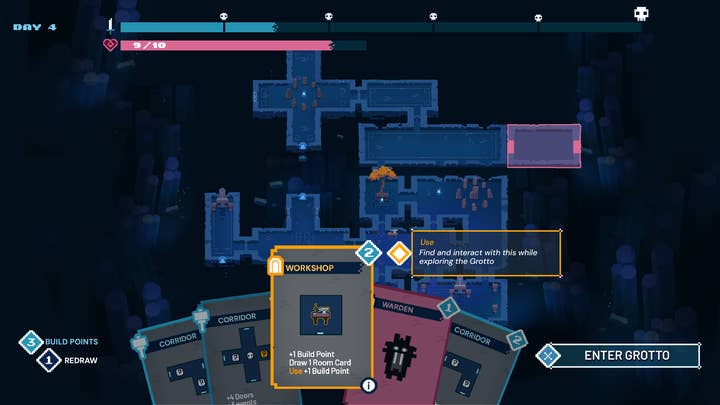'Singles, Not Albums': A Guide to Developing Smaller Games | GI Sprint
Ant Workshop, based in the UK, is undergoing a notable transformation in its game development strategy. Tony Gowland, the studio's managing director, believes this could be advantageous for many in the industry.
The studio had previously invested two years and around £750,000 in Dungeon Golf, an unconventional mini-golf game. Despite positive player and critic reviews and significant marketing efforts, the game failed to capture a wide audience.
Unable to continue investing in large projects, Ant Workshop drew inspiration from publishers' diverse portfolio strategies.
"We needed to release more projects more quickly and with smaller scopes, adapting a more agile approach," Gowland states. "We spent about 15 months on Dungeon Golf before its public release—something we wanted to avoid in future endeavors."
Gowland discussed this new approach with Gary Penn, known for his work on Grand Theft Auto, who encapsulated it perfectly.
"He said 'If Dungeon Golf is an album, what you're creating now are singles,'" recalls Gowland. "It was the perfect description. We can't afford another 'album'; instead, let's take more risks with smaller, varied projects, produced within tighter budgets and timelines, getting them to the audience faster."
The new focus is on developing games with budgets between £50,000 to £100,000 within a four to six-month timeframe, a model also adopted by studios like Bithell Games with their narrative shorts.
Simplify and Accelerate Development
Gowland emphasizes that the shorter development cycle prioritizes defining core concepts and mechanics early. Keeping games simple prevents unnecessary complexity.

"These 'singles' are small games without a plethora of features," he says. "We wouldn't, for instance, create an online multiplayer game within this framework—it would exceed the scope."
Reflecting on Dungeon Golf, Gowland noted that features like in-game commentators, despite mimicking televised sports, did not provide sufficient value and should have been reconsidered. He advises developers to be ruthless in prioritizing features.
Reevaluate and Reuse Past Concepts
Ant Workshop's inaugural 'single' is Into The Restless Ruins, a roguelike deck builder integrating card-based dungeon expansion.
This concept originated from an unrelated project—a 2D game involving plane mechanics. Initial ideas included attaching functional elements to planes, but the core flying mechanic never felt right.
"While iterating on the flying aspect, adding elements to the plane felt satisfying," explains Gowland. "We abandoned the flying concept and focused on this feature, which quickly became the basis for Into The Restless Ruins."

Create Games with Longevity
Shorter games don't have to be one-offs. Gowland urges developers to consider both replayability and potential for expansions. The goal isn't to abandon larger projects but to potentially scale smaller successes into bigger ones.
"We're focusing on ideas that can be extended. Initial releases should be modestly priced, with potential for future updates or sequels if they gain traction," he says. "Aiming for this flexibility allows us to enhance titles down the line."
Enhance Studio Agility
Like many game studios, Ant Workshop balances independent projects with co-development work. During Dungeon Golf's development, taking on external projects could have disrupted their schedule due to resource allocation.
"When working on smaller projects, if we need a couple of programmers for another initiative for two months, it's manageable. We have a variety of other tasks at hand," he mentions. "It's easy for our team to adjust their schedules and adapt accordingly. This approach has provided us considerable flexibility."
Gowland encourages developers not to hesitate to halt a project temporarily if it's not progressing well. For instance, Ant Workshop is currently working on a game where you operate a food truck catering to monsters, serving as many customers as quickly as possible.
"We've developed an initial prototype of that," Gowland states. "The concept is appealing but hasn't quite hit the mark. If it were a larger project, we’d have artists and programmers constantly working on it, trying to identify and fix issues through intensive efforts. However, with multiple 'singles' in progress simultaneously, we can set this one aside for a while and revisit it later with fresh ideas."
Inform Your Audience About Your Projects
Gathering player feedback is vital to determining which smaller games warrant more development time. Gowland reflects that this was a significant oversight in Dungeon Golf's development, as the game's secrecy lasted too long.
"Though working on 'singles' requires discipline, it allows for intense focus."
"For previous titles like Dead End Job, we've showcased them at local events and exhibitions like EGX Rezzed," he elaborates. "[With Dungeon Golf], we kept refining it internally until we felt it was ready for public viewing. Unfortunately, that moment never came, and the game didn't find a market - perhaps a suitable market for it just doesn't exist."
Presenting your game to the public early on helps gauge its potential audience and generate interest and wishlists.
Smaller Games Suited for Smaller Prices
Ant Workshop aims to price each of its 'singles' at a maximum of £5. Gowland believes this price point encourages "impulse buys," paralleling gamers' tendencies to pick up cheaper games during Steam sales. He likens this to his childhood experience of buying affordable Acorn Electron games with pocket money.
"Sometimes you find gems, and that's great; other times, it's less impressive but doesn't feel like a substantial loss – it's a small gamble with pocket money," he explains. "Currently, many quality games on Steam are being launched at £4 or £5."
Additionally, lower prices temper player expectations.
"Cheaper games come with fewer expectations for high-end art and other qualities – look at Vampire Survivors," Gowland points out. "As long as you're transparent with people about what to expect, you can set realistic expectations for a smaller project with considerable replay value."
Adjusting Success Metrics
Gowland explains that the break-even point for games adjusts proportionally to the budget. He estimates that selling 20,000 units of their 'singles' would suffice for Ant Workshop to break even.
Again, pricing plays a crucial role; while selling 20,000 units is challenging, it's more achievable at impulse-buy prices than at higher prices, where players might wait for a sale.
Gowland notes that this mirrors how publishers manage their portfolios.
"We don't anticipate every single to break even. A quarter of them might, or maybe even fewer, but each contributes something. Plus, we gather valuable data and feedback from actual players."
"Since the investment in each game is small, we can afford to experiment and learn. By the second year, we'll have refined our approach considerably, identifying popular elements to replicate and expand upon."
Gowland will participate in tomorrow's GI Sprint panel, discussing the importance of failing fast, a crucial aspect of developing games more efficiently.
